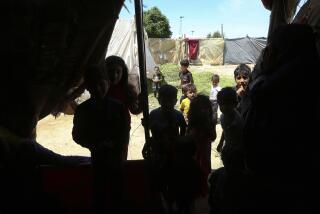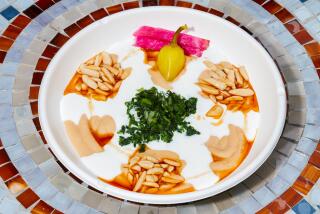Circassians’ Special Niche in Jordan : ‘Cossacks’ Seem out of Place in Arab Palace
- Share via
AMMAN, Jordan — Of all the examples of foreign culture that have been transplanted to the Arab world, few present a more arresting sight than the warriors in Cossack uniform who stride through the corridors of King Hussein’s palace.
With black astrakhan hats, fierce mustaches, silver swords and chests covered with brass cartridges, the members of the king’s guard look as if they have marched out of the pages of a Tolstoy novel rather than being at the center of a modern Arab capital.
Actually, the guards are not Cossacks but Circassians, whose forebears were among the most fearsome fighters of the Caucasus. Although the Circassian Guards these days have become as ceremonial as their Swiss counterparts at the Vatican, Circassians have retained a special niche in the inner sanctums of the Jordanian kingdom that belies their tiny numbers here.
Layered in Hierarchy
Earlier this year, a Circassian named Mohammed Ali Amin was appointed governor of Amman, joining a government minister, army generals and top intelligence officials who are among the Circassians in the top layers of Jordan’s bureaucracy. The last four directors of Jordanian security have been Circassians.
The regular guard for the ruling Hashemite family wears olive drab and green berets these days, and while its composition is a state secret, Circassians proudly assert that they still constitute a majority of its members.
“It’s a matter of trust,” said Mohammed Haghandouqa, author of a local history of the Circassians. “Whenever there is money or security involved, they put a Circassian in charge. There’s never been a Circassian convicted of embezzlement or treason. For us, it’s a religious conviction.”
It was religious beliefs that brought hundreds of thousands of Circassians pouring into the Middle East in the late 19th Century from their home villages in the northern Russian Caucasus.
Sword-Point Converts
The Circassians, who have been known variously as Ants or Narts, thrived in the rugged mountain terrain of the northern Caucasus as Orthodox Christians but were converted to Islam at the point of a sword in 1717 by the Turks of the Ottoman Empire.
A century and a half later, the Circassians were defeated by the Russian Czar, who had annexed their land, and nearly 2 million Circassians fled into Turkey rather than stay under Russian, and Christian, rule.
Prized for their equestrian and military prowess by the Turks, the Circassians saw duty throughout the Ottoman Empire. A large detachment of them was dispatched into Syria and present-day Jordan to guard the Hijaz Railway that carried Muslim pilgrims from Istanbul to the holy city of Mecca.
When they first arrived in the Arab world, the Circassians spoke no Arabic and found the customs completely alien. One account states that upon hearing they had reached the “Holy Land” of Palestine and seeing barefoot Bedouin shepherds, the Circassians removed their shoes, believing that the Bedouins were following some sort of obscure religious rite.
Settled in Amman
The Turks settled a sizable Circassian contingent in Amman in the 1870s, at a time when the site consisted of barely more than a few Roman ruins. The town remained a Circassian village for several decades.
It was the arrival in the area of the Hashemite King Abdallah from what is today Saudi Arabia that ensured the success of the Circassians in Jordan.
Abdallah, like the Circassians, was more or less a refugee from his homeland after a military defeat there. As a descendant of the Prophet Mohammed, he commanded the great respect of the Circassians, who had become devout Muslims.
The loyalty of the Circassians was demonstrated in 1923, when a mutiny against Abdallah by local tribes in Kerak was suppressed by a Circassian battalion, paving the way for the formation of the Emirate of Transjordan, predecessor of today’s Jordan.
The Circassian historian Mohammed Haghandouqa estimates that there are about 65,000 Circassians in Jordan today, compared to more than 1 million in Turkey and more than 100,000 in Syria. Yet they prosper in Jordan as nowhere else.
Many Still Use Own Tongue
After 100 years here, the process of assimilation is well advanced, although Circassians still tend to live in the same areas in which their ancestors settled. In such areas, it is still not uncommon to hear Circassian spoken.
“I speak Circassian, but not all the new generation speaks the language,” said Walid Tash, a former secretary general of Jordan’s Foreign Ministry. “I suppose in 100 years, the language will disappear here.”
While Circassians in Jordan now tend to enter the professions, such as law or medicine, they are still known primarily as a military people.
“Circassians are a martial people,” said Capt. Arslan Ramadan, a former captain of the royal guard unit. “They are a tough but handsome people,” he added.
“Partly because of their military background, Circassians tend to be loyal to the land wherever they are,” said Nabiha Hassan, who heads the Circassian Benevolent Assn. in Jordan. “They like battle. They like acts of bravery.”
‘Too Honest’ for Business
While a small number of Circassians have become prosperous by selling their ancestral farmland to developers in the burgeoning capital city, Circassians generally have not made their mark in business.
“They are too honest to be good businessmen in the Middle East,” Ahmed Sherkas, a government official who is half Circassian, observed.
Their reputation for probity is so great that the Jordanian power company, the second-largest employer in the country after the government, used to have an informal policy of hiring only Circassians, though the director was himself from a local Arab family.
Young Drilled on Morals
Although most Circassians are at a loss to explain what differentiates their upbringing from that of others in Jordan, one notion that persists in the Circassian family is the notion of Adighe Herza , which in the Circassian language means Circassian wisdom. What that amounts to in practice is that parents drill into their children, “Don’t cheat, don’t lie, don’t steal,” until such practices become abhorrent.
“From the day you are born, people are constantly telling you ‘Don’t do that,’ ” Circassian pediatrician Ahmed Shukom noted.
Until recently, Circassians rarely married other Jordanians and had little in common with their Arab brethren here. They still love wild dancing, for example, and there are fewer strictures on the social mixing of men and women.
Few Divorces, No Polygamy
Circassians rarely get divorced and do not practice polygamy, which is permitted under Islam.
There are even a few vestiges of the Christian traditions that prevailed in their homeland until 200 years ago: the word for Sunday in Circassian means “day of God,” although Friday is now their holy day. And Circassian bakers, perhaps unwittingly, make a cross upon loaves of bread in a silent benediction.
Although most Circassians are now fully assimilated into Jordanian society, their ethnic origins are often betrayed by a round Slavic face or blue eyes, or even names such as Natasha and Tamara, which are still popular.
In conversation, Circassians tend to be somewhat condescending about other Arabs, even to the extent of denying that they have become Arabs themselves.
“In time, we will become Arabs,” said the historian Haghandouqa. “But for now, we are Circassians.”
More to Read
Sign up for Essential California
The most important California stories and recommendations in your inbox every morning.
You may occasionally receive promotional content from the Los Angeles Times.













